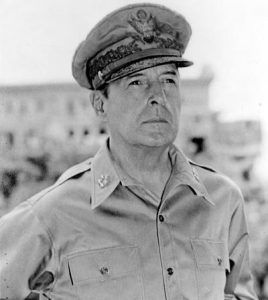Douglas MacArthur was America’s senior military commander in the Far East during World War Two. MacArthur found fame as the officer who led America’s withdrawal from the Philippines with the quote “I shall return”. It was a promise that Douglas MacArthur was to fulfill.
Douglas MacArthur was born in 1880 in Little Rock, Arkansas. He was educated at West Point Military Academy and gained a commission into the engineers in 1903. In 1905, MacArthur was sent to work in Tokyo where his father was America’s official observer of Japan’s military operations against Russia.
When America joined World War One in 1917, Douglas MacArthur was sent to France where he distinguished himself at the second battle of the Marne. When the war ended in November 1918, MacArthur was the youngest divisional commander in the field.
From 1930 to 1935, he was Chief of Staff of the American Army.
In World War Two, after the attack on Pearl Harbour, Douglas MacArthur was put in charge of the Philippines where he had to defend the islands against an attack by the Japanese. In this he failed, but few western commanders had been successful against the Japanese at the start of the Pacific War – as the British had found at Singapore.
The withdrawal of American forces from the Philippines was a huge blow to America’s military but it only made Douglas MacArthur more determined to take back the islands. By 1943, America was in a position to attack the Japanese. However, rather than take every single island in the area, Douglas MacArthur decided on what became known as ‘island-hopping’. This tactic meant that the Americans took the larger more important islands captured by the Japanese in the Pacific (such as Iwo Jima and Okinawa) and left the smaller ones to “wither on the vine” (Douglas MacArthur). Regardless of this, America’s casualties were still high and any attack on mainland Japan itself was fraught with dangers. American intelligence estimated that 1 million American soldiers would be killed or wounded if America attempted to take Japan itself. As a result of this, President Truman ordered the use of the atomic bomb on Hiroshima and Nagasaki.
Douglas MacArthur had a detailed knowledge of Japan and Japanese culture. As Supreme Commander of Allied Forces in the Pacific, MacArthur became the head of the occupation forces in Japan from their surrender in August 1945 to 1951. One of the first things he did was for the emperor, Hirohito, to announce on radio to the people of Japan, that he was not a god and just a mortal. He also used his influence to ensure that the emperor was not put on trial for war crimes as he feared that it might provoke a massive negative reaction amongst all those people who were still in Japan. Only those in the government or the military, such as Tojo, faced a public trial.
Douglas MacArthur did a great deal to rebuild a nation severely damaged by the war. Japan was given a democratic constitution and internal reforms – dominated by MacArthur himself – moved Japan forward as a nation. Ironically, there was more resentment in Washington DC for what Douglas MacArthur was doing, than there was in Japan. Some American politicians disliked the power MacArthur had accrued.
After his involvement in World War Two, Douglas MacArthur remained in the limelight as head of the United Nations force that took on the North Koreans in the Korean War. In this position, MacArthur showed his military genius with the amphibious landing at Inchon which was very risky and some would argue defied military logic. That it was so successful further enhanced MacArthur’s military stature.
The government in Communist China threatened to intervene in the Korean War if UN troops pushed beyond the 38th Parallel. President Harry Truman ordered MacArthur to push to the Yalu River. Truman failed to give the order MacArthur wanted which was to destroy the bridges that crossed the Yalu River. The destruction of these bridges would have made it very difficult for the Chinese to have crossed the river in substantial numbers. As it was, the bridges were not destroyed and the Chinese were able to pour into the Korean peninsula vast amounts of men and supplies. When MacArthur protested about the failure to give the order the destroy the bridges, he was relieved of his command and replaced by General Matthew Ridgeway.
MacArthur returned to America as a hero. At the time of his dismissal, the “Chicago Tribune” stated that Truman was not fit to tie MacArthur’s shoes but any hopes of a career in politics after his military one came to nothing and from 1952 until his death in 1964, aged 84, Douglas MacArthur lived out his retirement in Manhatten.
